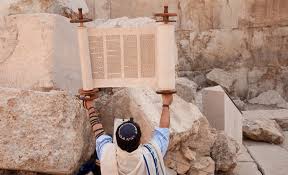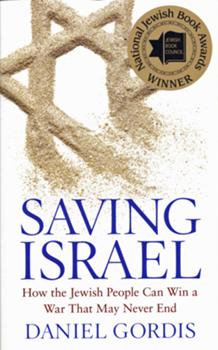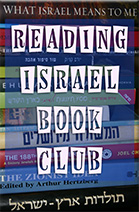Saving Graces, Saving Israel
By David Brumer
Daniel Gordis's important book, Saving Israel, calls for nothing short of reinventing modern Zionism. For without such a reinvention, the very continuance of the Zionist enterprise is in mortal danger. Gordis makes clear that what is at stake is not just the perpetuation of the Jewish state, but the very existence of the Jewish people.
Gordis points to the poetry of pre-state Zionists like Natan Alterman and Haim Bialik, noting that while they criticized and challenged the biblical ethos of the Jews, they were steeped in the richness of those sacred texts and in the history of our people.
Today, many an Israeli is ambivalent about his or her army service, is hard pressed to explain why he should pay exorbitant taxes and live by the social dictates of what he considers medieval religious fanatics, and wonders aloud about the merits of or need for a Jewish state.
Too many of these Israelis, warns Gordis, no longer believe in a Zionist ethos in large part because they have lost the connection to their roots in Jewish life. Gordis is talking about Jewish identity and Jewish history, not necessarily Jewish religious life, an important subject he tackles in other chapters.

To make matters worse, all this disaffection and disconnection come at a time when Israel is facing external threats from implacable enemies like Hezbollah, Hamas and Iran, enemies with demonic designs against the Jewish state.
Without a deep and abiding sense of purpose, which can only come from a profound belief in Jewish rootedness in Zion, including a belief in the justness and rightness of the Zionist project, no one in their right mind would continue making the kind of sacrifices called for in Israel.
If the goal is to be just another "normal" country in the family of nations, Zionism - read, Israel - is destined to fail, according to Gordis. In the chapter "Not Just a Hebrew-Speaking America," he describes why the America ideal is a dangerous model for a country with very different goals, living a very different reality in a very different neighborhood. Gordis argues that the normality that Israelis have long yearned for is impossible to attain and not even desirable.
"For normalcy as a goal will not breed the kind of distinctiveness that Israeli survival will require. If Israelis cannot articulate anything profound about Jewish civilization, or say anything about the grandest ideas that have long been at the core of Jewish life, what possible reason could there be to continue to defend a Jewish country?"
Gordis's writing is at its strongest and most cogent when he discusses the imperatives of that defense. He explores the uncomfortable history of our people in relation to power, and then makes a compelling case for Israel's prosecution of an unending series of moral wars.

Clearly, many Jews today, including some Israelis, subscribe to the credo that war and the use of force is "un-Jewish." This is particularly so for Western Jews, especially those who've been raised in the comfort and safety of America. Many have a visceral aversion to war, are committed to the principles of pacifism and find themselves at odds with Israel's military actions.
Gordis concludes that the pacifist option would lead to national suicide of the Jewish people. Nonviolence is a luxury that we can ill afford. Instead, he suggests that we defend ourselves when necessary, "occasionally using massive force, with all the ambivalence that that inevitably arouses." We should embrace the often ignored Jewish tradition's understanding that the use of military might is sometimes a necessity (in fact, Jewish law has an entire category of war, milhemet mitzva, "commanded wars," or wars that must be waged), and in certain circumstances, the only thing that will keep us alive in an increasingly hostile world.

Copyright © Josh Evnin/Flickr
Rather than providing the answers, Gordis suggests that the best way forward is to allow these questions to percolate in the free marketplace of ideas.
He recommends restoring Judaism to the heart of Israel's national debate. Included in that Judaism is not just religion but Jewish history and Jewish tradition. It should be no more the sole province of the ultra-religiousharedim than staunchly secular Israelis. The challenge is to foster dynamic and creative debates in the Zionist public square about what the Jewish state should be, and why it matters to have a Jewish state in the first place.
Gordis cautions that our greatest strengths can prove to be our greatest weaknesses (and undoing).
We are by nature a self-reflective and self-critical people, and this has served us well. We must not let that healthy tendency veer into self-flagellation and worse, self-loathing. This can be seductive to some, when peace seems more distant than ever. It must be one party's fault, goes the reasoning, and since the Palestinians are increasingly seen by the world as the victim, then the fault must lie with the Jews.
These are not easy tasks. Jews the world over will need intellectual and moral fortitude to withstand the avalanche of criticisms, attacks and vilifications that do not relent, as the Israeli-Palestinian conflict shows no signs of resolving in the near future. And Israelis will increasingly need to gird their loins as well, for the likelihood is that their children will continue to be called to the battlefield.
Courage, resolve and commitment will be needed. This can only happen with a renewed sense of purpose, a redefining of what the Zionist enterprise is all about and why it matters to not just Israelis, but Jews all over the world.

David Brumer is a media analyst, writer, and consultant on Middle Eastern affairs. In 2005 he received Congressional Recognition for Excellence in Public Diplomacy in Support of Israel on behalf of his work with The Israel Project. David was Administrator of the first Jewish Hospice in the Pacific Northwest.
Read the complete book review HERE







